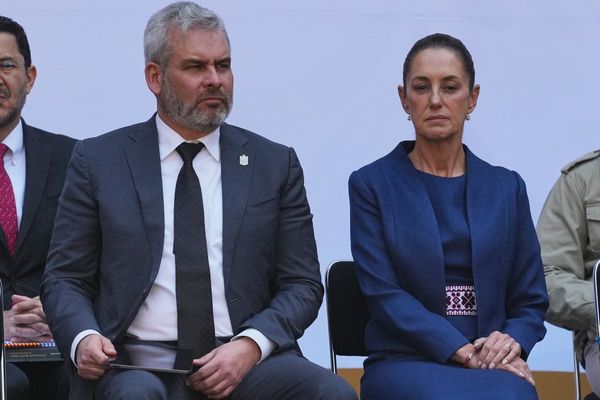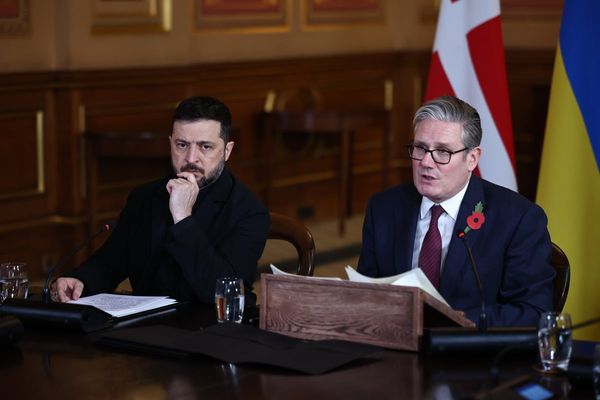Israel’s military has said it killed two top Iranian military officials in overnight strikes as European diplomatic efforts to bring the US and Iran back to the negotiating table stalled.
An Israeli military official said on Saturday that Saeed Izadi, the head of the Palestine Corps of al-Quds, the foreign branch of the Islamic Revolutionary Guard Corps (IRGC), had been killed in a strike on a flat in the city of Qom, central Iran.
The Israeli military said Izadi had played a key role in the financing and arming of Hamas before its attack on Israel on 7 October 2023, which killed 1,200 people, mostly civilians.
The official said Behnam Shahriyari, another senior official in al-Quds responsible for helping finance the Lebanese militia Hezbollah, had also been killed in a strike.
Iran did not acknowledge the deaths but said that four members of the IRGC had been killed, while Iranian media reported an Israeli strike on a building in Qom.
After talks between the Iranian foreign minister, Abbas Araghchi, and European counterparts in Geneva ended on Friday evening with no breakthrough, Iran launched a salvo of missiles at Israel in the early hours of Saturday morning.
A building in central Israel caught fire after being hit by the shrapnel of an intercepted Iranian missile. Later on Saturday, a drone strike hit a residential building in north Israel, damaging the building. No casualties were reported from the missile barrage or the drone strike.
Araghchi’s meeting in Geneva had been aimed at reviving nuclear negotiations between Washington and Tehran in an attempt to reach a ceasefire between Israel and Iran. The foreign ministers of the UK, Germany and France, along with the EU’s high representative, set out a proposal that included Iran moving to zero uranium enrichment, restrictions on its missile programme and ending Tehran’s financing of proxy groups.
Emmanuel Macron redoubled diplomatic efforts on Saturday, speaking with the Iranian president, Masoud Pezeshkian. The French president emphasised that Iran must “never acquire nuclear weapons” and said talks should be expedited.
“I am convinced that a path exists to end war and avoid even greater dangers. To achieve this, we will accelerate the negotiations led by France and its European partners with Iran,” said Macron in a post on X.
But Iran seemed unimpressed by the European diplomatic initiative, with one senior Iranian official telling Reuters that zero uranium enrichment was a dead end and that it would not negotiate over its ballistic missile programme.
“In any case, Iran will review the European proposals in Tehran and present its responses in the next meeting,” the Iranian official said.
Speaking in Istanbul, Araghchi said it would be “very, very dangerous for everyone” if the US intervened militarily in Israel’s war with Iran.
Donald Trump has said that he will decide within two weeks whether or not the US will join Israel in its bombing of Iran, saying he is waiting to give diplomacy a chance. On Saturday it was reported that the US is moving B-2 bombers to the Pacific island of Guam as Trump weighs possible strikes.
Earlier, Yemen’s Houthis said they would target US ships in the Red Sea if Washington became involved in attacks on Iran.
In May, the US and the Houthis agreed a ceasefire under which neither side would target the other.
The war began on 13 June after Israel launched a wave of pre-dawn strikes on Iran in what it said was an operation aimed at preventing the country from obtaining a nuclear weapon. Iran quickly responded with missile and drone attacks, kicking off an escalating cycle of tit-for-tat bombings that has now entered its ninth day.
In Iran, at least 430 people had been killed and 3,500 wounded by Israeli strikes since fighting began, state media said. At least 25 people have been killed and hundreds injured by Iranian strikes in Israel.
At root of the diplomatic impasse was Iran’s insistence that talks with the US were impossible under Israeli fire – and Israel’s refusal to halt its bombing, a stance bolstered by Washington.
“It is obvious that I can’t go to negotiations with the US when our people are under bombardments under the support of the US,” Araghchi told reporters in Istanbul, where he was attending a meeting of the Organisation of Islamic Cooperation.
On Friday, Trump said: “Israel is doing well, in terms of war, and Iran … is doing less well. It’s a little bit hard to get somebody to stop.” He added that the US was “ready, willing and able” to negotiate and that it had been speaking to Iran.
European politicians have urged the use of diplomacy to reach a ceasefire, stressing that an expanded Israeli-US-Iran war could spiral out of control.
Vladimir Putin has said he is willing to mediate between Israel and Iran, the latter of which is a close ally of the Kremlin. In an interview with Sky News Arabia on Saturday, the Russian president said Moscow was opposed to the proliferation of nuclear weapons but there was no evidence that Iran aimed to build any.
“We believe Iran has the right to use nuclear energy peacefully, and we are ready to help,” Putin said, echoing Iran’s insistence that its nuclear programme was meant for civilian purposes.
In a 31 May report, the International Atomic Energy Agency said Iran had produced enriched uranium to a level of 60%, which the nuclear watchdog said was of “serious concern”. US intelligence said Iran was up to three years away from producing a nuclear weapon.
Israel deployed 50 aircraft over Iran overnight, hitting the Isfahan nuclear site for the second time. Later in the day, large explosions were reported in the oil-producing region of Khuzestan in western Iran, as Israel’s military said that it was attacking “military infrastructure” in the area.
Israel’s foreign minister, Gideon Saar, said in an interview on Saturday that its attacks had delayed Iran from obtaining a nuclear bomb for at least “two or three years”, and that the Israeli military campaign would continue.







